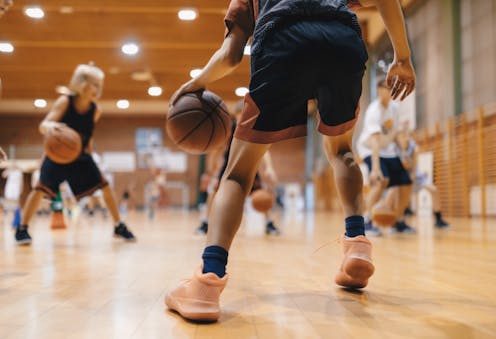Faster, stronger … smarter? New research shows the importance of brain training for junior athletes
- Written by Kylie A Steel, Senior Lecturer in Motor Learning and Skill Acquisition, Western Sydney University

“Look for the gap!” “Move into space!” “Who’s free?”
Sound familiar?
From the sidelines to the field, court or pitch, no matter the team sport, looking for relevant information in the playing environment can be as important as any other skill if you want to score … and hopefully win the game.
Think Lionel Messi, Scott Pendlebury, or Natalie Medhurst, coolly assessing all the options before making pivotal decisions.
How do these elite athletes become so great? As well as their physical attributes, their brain power is an obvious asset.
Cognitive power in sport
Regardless of whether an athlete is playing under-5’s soccer, backyard cricket or Olympic basketball, their playing environment holds important information that must be found, interpreted and then acted on.
As the athlete becomes more experienced with repeated game play, they become used to exploring the environment and the likely outcomes for different choices – such as in soccer, deciding on a long kick or a short pass.
This is how motor (movement) and cognitive expertise develops and can increase tactical and strategic options and solutions[1].
Cognitive expertise refers to factors such as decision-making, attention and perception, which are essential for skilled performance.
A key part of making decisions in sport, particularly fast-paced sports, is knowing where to look to find the most useful information around you. In other words, where you should direct your attention, particularly visual attention.
Research tends to find skilled players are better at looking for and seeing the options and what’s happening around them in the playing environment[2].
For example[3], skilled players tend to have a wider focus of attention (when needed) – this means they look both at an opponent and where they can move to next.
Less skilled players, on the other hand, tend to have a narrower focus of attention. They might watch only one detail (such as the ball) but not what is happening around them.
An eye-tracking activity with soccer star Cristiano Ronaldo showcases this well:
Scientists have used eye-tracking technology on soccer superstar Cristiano Ronaldo.Skilled players are also often faster to make decisions compared to less skilled players; their experiences create more stored memories that help speed up their decision[4]-making[5].
In essence, skilled players know what information is the most relevant to focus on and they act on it quickly.
Training the brain
Many in high performance environments acknowledge that we are near our physical limit[6] with current practices.
Despite this, many coaches and athletes focus on the physical aspects of preparation such as speed, endurance and strength.
This focus is understandable – concentrating on physical aspects might work for sports that are driven largely by factors such as physical capacity and less by specific skills.
For sports like soccer, Australian rules football, hockey and basketball however, where complex thinking skills are needed, this approach is limited[7].
To put it simply: being able to move quickly and powerfully is helpful. But if you’re running to the wrong spot, or kicking to a teammate in a bad position (overlooking a much better option), this lack of cognitive skill can limit success.
And there is more we can do with cognitive processes as our understanding continues to grow.
New research shows the importance of brain power
A recent study[8] from Western Sydney University looked at Australian rules football players aged 14-18, and the skills they need to play at higher levels.
The researchers wanted to explore how junior players look around the field and make passing decisions, and if these behaviours stay the same over time (18 months, to be exact).
They found, similar to adult athletes, there are distinct differences for visual behaviours and decision-making abilities between skilled and less skilled juniors.
The more skilled players were more accurate in their decision-making and visual search behaviours, focusing on the most relevant game play information such as free players or space to move into.
Processing information under pressure is also key to skilled performance, with research showing physical fatigue affects decision-making[9], often leading to errors in decisions that can be costly.
For coaches, it is particularly important to consider cognition and fatigue in training – simulating game-like pressure is useful for players to get used to the types of pressures they will experience in competition.
Adding to this picture is new research[10] that explores the negative impact of mental fatigue on physical performance. This work showed our ability to exercise can be impaired after activities requiring long periods of thinking and mental effort, particularly when these activities are boring.
This research is unique, as it considers the impact of using the brain so much that it makes you physically tired (often, we view fatigue from the perspective of how physical fatigue effects thinking).
This may be particularly relevant for coaches of young players transitioning from the school day to training, especially if the day’s lessons have been complex.
Coaches should therefore consider the amount of information they provide athletes and the complexity of the tasks and instructions.
Striking the right balance at training
Overall, cognitive skills, like physical attributes, are key to high performance and even play a role in identifying future potential.
Developing talent in sports is a key focus for many sports clubs but the process relies mostly on testing physical and physiological aspects.
The research conducted at Western Sydney University showed cognition could be a reliable marker of ability over time and provide some basis for prediction of talent.
If so, the methods used or similar approaches could be included in talent identification protocols.
References
- ^ solutions (research.stmarys.ac.uk)
- ^ environment (journals.sagepub.com)
- ^ For example (www.tandfonline.com)
- ^ decision (www.frontiersin.org)
- ^ making (link.springer.com)
- ^ near our physical limit (www.theguardian.com)
- ^ limited (link.springer.com)
- ^ study (www.frontiersin.org)
- ^ decision-making (journals.lww.com)
- ^ new research (www.sciencedirect.com)

















